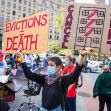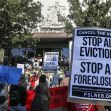It won’t be a happy New Year for millions of Americans if the government’s moratorium on housing evictions expires on New Year’s Eve -- a night when people traditionally celebrate without worrying that their families may soon become homeless and freeze. With this in mind, Patricia Lee Refo, President of the American Bar Association, urged Congress to immediately enact a new moratorium on evictions along with economic relief for the owners of rental property.
In a December 1 letter to House Speaker Nancy Pelosi, Senate Majority leader Mitch McConnell and other House leaders, Refo warned that the nation’s legal and social services would be overwhelmed if Congress once again fails to protect blameless homeowners and renters, as well as affected rental property owners, who have lost their jobs or revenue as a result of the pandemic.
“The required investment is significant,” Refo stated, “but the cost of inaction will be far greater and enduring. I therefore urge you to institute a new moratorium against evictions before December 31, 2020 and to provide relief to affected rental property owners until such time as emergency health restrictions have eased and the economy has stabilized.
“The required investment is significant, but the cost of inaction will be far greater and enduring,” Refo said.
The history of COVID-19-related Congressional actions and their journey or non-journey to the desk of President Trump is fraught with bitter fighting. The final compromise Coronavirus Aid, Relief and Economic Security Act, known widely as the CARES act, provided $2.2 trillion in economic relief and was signed into law by the President on March 27, 2020.
Since then, Refo has written two other letters to Congressional leadership on the same topic. In July and again in September, she predicted the “severe consequences that a new wave of evictions would have on public health.” Her letter reminded legislators that the eviction moratorium was not even current law. It was only extended by the federal Centers for Disease Control’s (CDC) actions to extend the moratorium when the one enacted by Congress expired.
The CDC’s current moratorium extends from September 4th to the end of the calendar year. It was put in place only because Congress failed to act. Refo stated that while some questioned the legality of the CDC’s actions, they were taken in recognition of “the severe consequences that a new wave of evictions would have on public health.”
The CDC’s order prohibits payment-related evictions of tenants who declare incomes of $99,00 or less or $198,000 or less for couples. Under penalties of perjury, claimants must also prove they suffered financial harm as a result of the pandemic and that no safe alternate housing is available. The CDC order does not apply to state or local jurisdictions that have their own laws with equal provisions.
The result has been a hodgepodge of confusing, inconsistent, and ever-changing regulations that have caused widespread uncertainty for both landlords and tenants. Consequences, according to the American Bar Journal, will extend beyond the pandemic, since eviction records will hamper renters’ efforts to obtain new housing for years to come.
Stacy Butler, director of the Innovation for Justice Program at the University of Arizona James E. Rogers College of Law told the ABA Journal, “The truly terrifying story here is the magnitude of the impending eviction crisis—10 times our historic rate of eviction. People do not understand the ripple effect this eviction crisis is going to have. It is so much greater than individuals losing homes. It is going to upend the housing market and devastate entire communities. Decision-makers need to be thinking about massive rent relief strategies.”
Perhaps to explain the broader implications of ending the moratorium beyond families, Refo emphasized its effects on the owners of properties that rent for $750 per month or less. These units, she explained, comprise more than half of the country’s rentals. She explained that the CDC’s action did not alleviate the need for landlords to continue making their own mortgage and tax payments while they were receiving no rent from their tenants. If the moratorium expires, units owned by these landlords are likely to remain empty, so revenues, frozen since April, are unlikely to return.
Refo also provided accounts of studies that linked homelessness to poor health, malnutrition, respiratory disease, anxiety, depression and suicide, and explained that children are most affected. In addition, crime is likely to rise as a result of vacant properties, and costs to state and local government will escalate.
Refo concluded by reminding lawmakers that the House has already proposed $100 billion for economic relief and urging them to include this investment in the next stimulus package “in light of the dire consequences to the economy if millions of families are simultaneously displaced and the affordable housing market shrinks.”






